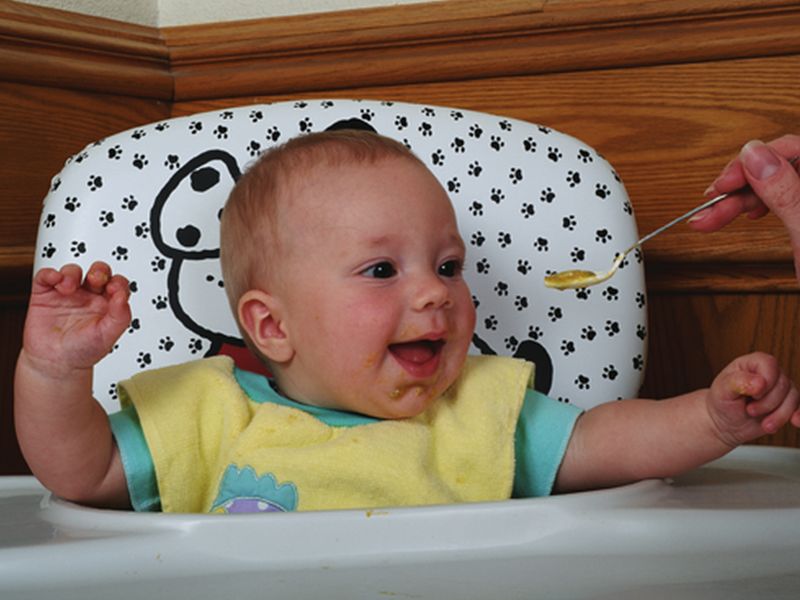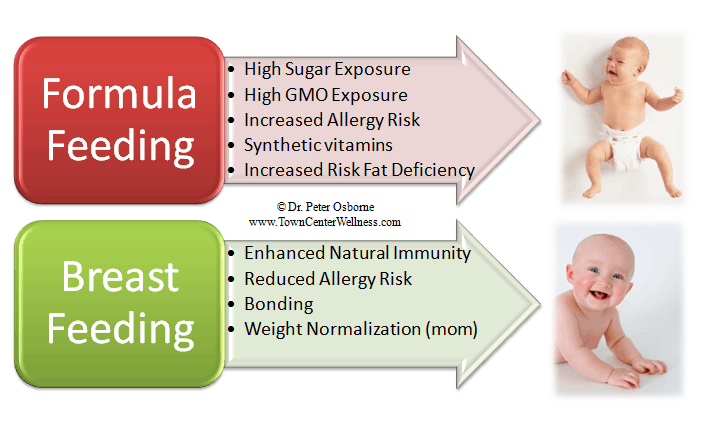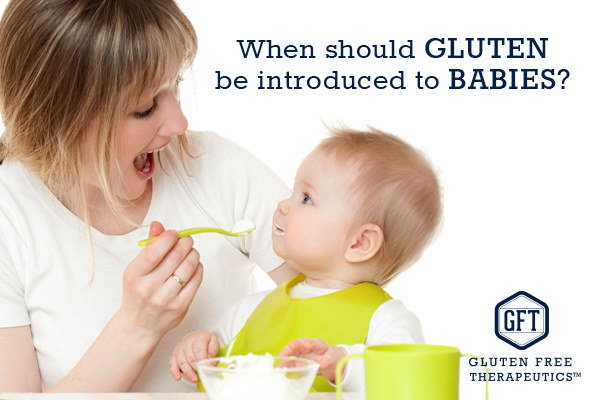celiac disease in breastfed babies
Celiac disease is an immune-mediated systemic disease triggered by intake of gluten in genetically susceptible individuals. The influence of gluten intake in the first years of life as a potential risk factor for celiac disease is currently debated among researchers.

Does My Baby Have A Gluten Allergy Parents
While it is always important to adhere to a strict gluten-free diet it is even more crucial when breastfeeding your baby.

. Breastfed babies may gain weight and grow more slowly than formula-fed babies when they are aged 6 months to 1. 4 The notion of a window of tolerance was supported by a prospective cohort study that found. Experts also think that some antibodies immune system chemicals related to celiac disease might damage the placenta.
Babies who have an increased risk of coeliac disease should be weaned in the same way as any other baby. Symptoms of celiac disease in infants and toddlers include. People with celiac do not.
Babies in the study were fed two whole wheat biscuits per week before 6 months of. This means that it is only once gluten containing solids are introduced to the diet that it is possible for coeliac disease to occur in an infant. Breastfeeding itself is one of the best things you can do for your baby as it provides complete nutrition and critical immune factors for your baby.
For coeliac disease to develop an adequate amount of gluten needs to be eaten regularly. An epidemic of celiac disease among young children in Sweden during the 1980s and 1990s was attributed to a number of feeding practices thought to be conducive to the loss of tolerance to gluten including a lack of breastfeeding and high gluten content during its first introduction. Failure to thrive including a failure to gain weight or even weight loss Swollen stomach Diarrhea Constipation Irritability Fatigue.
Currently there is no evidence on the optimal breastfeeding duration or the effects of avoiding early. Introducing gluten while still breastfeeding decreases the risk of celiac. Having Celiac Doesnt Mean You Cant Breastfeed.
Women with celiac disease who fail to follow a gluten-free diet have been shown to breastfeed for a shorter period of time. The mother need not eliminate gluten from her diet since the quantity transferred to the breast milk is insufficient to trigger an immune response in the babys body 4. Young children may have abdominal pain with nausea and lack of appetite anemia not enough iron in the blood mouth sores and allergic dermatitis skin rash.
New data suggests that feeding babies gluten between the 4- and 6-month mark on a consistent basis may result in a reduced risk of developing celiac disease. If after checking with your health visitor or doctor you decide to start weaning before six months you should avoid. The disease makes it hard for your body to absorb enough vitamins and minerals.
While on a strict gluten-free diet celiac disease should in no way interfere with a healthy breastfeeding experience for you and your child. There are two key ways. How Celiac Disease Affects Pregnancy.
Its prevalence differs depending on geographical and ethnic variations. In the past CD was thought of as a childrens malabsorptive disease and was characterized by chronic diarrhea abdominal. The same AAP policy goes on to say There is a reduction of 52 in the risk of developing celiac disease in infants who were breastfed at the time of gluten exposure But this Norwegian study effectively found that following the current advice of the AAP seems to increase a babys risk of celiac not decrease it.
The direct correlation between celiac disease and breastfeeding is a hot topic. Celiac disease can lead to diarrhea abdominal pain constipation poor weight gain or joint pains and rashes. For years experts theorized that breastfeeding and timely introduction of gluten could protect children from celiac.
Breastfed babies seem on the whole to be much healthier than formula fed babies. Ad Learn more about the signs that may reveal you have an Issue that need attention. Therefore exclusively breastfed babies do not develop the condition.
Celiac disease in breastfed babies Sunday March 6 2022 Edit Even though it can affect older children rickets mostly affects infants and preschool children and can be present at birth congenital in babies born to a woman with low levels of vitamin D. More data is needed to determine whether this is a true risk reduction or a delay in onset. The longer infants are breastfed the lower their risk of celiac disease.
Breastfeeding is not a risk factor for celiac disease since breast milk does not contain gluten. Infants with celiac disease commonly have abdominal pain and diarrhea even bloody diarrhea and may fail to grow andor gain weight. And in turn your baby wont get enough.
Data indicate that celiac disease begins long before the body begins to have an immune response to gluten. Early research hinted that introducing gluten while still breastfeeding between 4 and 6 months of age might prime a. Children who develop celiac disease tend to have fewer healthy protective bacteria such as bifidobacterium and lactobacillus.
Celiac disease CD one of the most common autoimmune disorders in the world is also one of the most underdiagnosed in no small part thanks to the many different ways it can present in the clinic. The prevalence of celiac disease in the general population is estimated to be 1 in the world. Delaying gluten introduction until 12 months of age reduces the risk of celiac disease.
In addition with regards to celiac disease one study showed that breastfeeding your infant particularly during the time of gluten introduction may significantly decrease their chance of. Children with Celiac Disease are often irritable fretful emotionally withdrawn or. In addition one study showed the breastfeeding your infant particularly during the time of gluten introduction may significantly decrease their chance of acquiring celiac disease.
Infant feeding and risk of developing celiac disease. No it is not possible for a baby to develop coeliac disease while only being breastfed. While many people have varying opinions of whether or not breastfeeding can contribute to the onset of celiac new studies demonstrate some very important findings.
At around six months your baby will be ready to eat solid foods as well as still needing breast or formula milk.

Should Women With Gluten Sensitivity Breast Feed Gluten Free Society

When Can Babies Start Eating Baby Food Cleveland Clinic

Coeliac Disease Gluten Allergies In Babies
/GettyImages-1008809966-fa2a1e6c7e0a426d8f87f2024f75e76e.jpg)
Study Feeding Babies Gluten May Reduce Risk Of Celiac Disease

Does My Baby Have A Gluten Allergy Parents

When Should Gluten Be Introduced To Babies Gluten Free Therapeutics

The Color Of Baby Poop And What It Means Cleveland Clinic

Exposing Babies To Wheat Very Early Might Prevent Celiac Disease Study

Does Breastfeeding Prevent Celiac Gluten Free Living

Monthly Baby Pictures In A Laundry Basket Monthly Baby Pictures Baby Month By Month Baby Pictures

Dr Lucy S Costco Chocolate Chip Organic Gluten Free Cookies Gluten Free Restaurants Gluten Free Chips Vegan Cookies

9 Benefits Of Pare For Coronary Artery Disease And Improve Heart Health Coutii Healthy Improve Heart Health Coronary Artery Disease Coronary Arteries

Celiac Disease Wheat Allergy And Gluten Sensitivity In Children Babycenter Babycenter

Best Rear Facing Car Seat For Small Back Seat Car Seats Rear Facing Car Seat Baby Car Seats

Coeliac Disease Gluten Allergies In Babies



